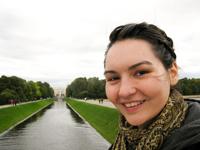Of cathedrals, canals, and constructivism

By Johannah Bird

Johannah Bird in front of the channel at Peterhof Palace.
Standing at the curb, waiting for the light to change at the intersection, I look over to the Triumphal Arch. This formidable green structure was built to commemorate Napoleon's defeat in the War of 1812. I think about what our art teacher has told us in recent weeks about other monuments and sculptures around the city. We are, in fact, on our way to the metro to meet her for another class.
The metro is warm and welcoming, unlike the wind and rain. As I slip a token into the gate, I pass through to ride one of the longest escalators I have ever seen. Over our heads, a patriotic relief features Lenin with an arm raised in salute to the noble-looking workers who surround him. We descend on the escalator to where a train awaits us.
On the train, I try to read the Russian ads placed conveniently at eye-level. I am happy with what I can understand, but still wish I knew more. After our ride, we emerge into the light of Nevsky Prospekt—downtown St. Petersburg and the heart of the city. It is strange how the weather can differ from one part of the city to another. Our teacher has arrived, and we walk briskly to keep up so we can hear what she is saying about the city and its architecture.

Johannah Bird at the cascading fountains of Peterhof Palace.
I hear the voice of an American discussing traffic with his friend. My ears perk up at the sound of English being spoken by someone outside our small group—after four months of life in Russia, I am accustomed to hearing Russian all around me. I am surprised at how much I have learned and experienced since our arrival in August. It has gone far beyond my expectations.

Left to right: Alexander Ivanovich Negrov (SPCU’s rector), Justin Wollf, Adam Berg, Kevin Schur, Linsey Brasser, Brennon Patterson, John Bird, Janyne Johnston (program coordinator), Xenia Negrov, Tina Negrov, Lillian Negrov.
St. Petersburg is a city with an intriguing history and a multitude of sites, galleries, theatres, cafes, museums, and shops to frequent. We have been able to take advantage of low student prices to see ballets, operas, and masterpieces of world art. A short walk from our front door takes us to one of the most notable places to see buildings in the Constructivist style of architecture. A short metro ride and a brisk walk take us to some of the most famous districts in history immortalized in Dostoevsky's Crime and Punishment. We have seen the Hermitage, the Saints Peter and Paul Fortress, the Neva River, and numerous cathedrals and churches.
We have also visited Novgorod (the oldest city in Russia) and Moscow (the older giant of Russia's two major cities). We have seen where every deceased Russian leader has been laid to rest (including Lenin on display in the Mausoleum). We have seen the development of Russian art from its very beginnings to today. Every place we go is connected to an idea, poem, story, or event.
We live in dorm with the Russian students at the university, and most of us have Russian roommates. We're expected to immerse ourselves in student life, so we attend chapels, eat in the cafeteria, clean the dorm, and participate in events and activities (even when they demand a Canadian rendition of Russian traditional dance). I am continually amazed by the hospitality we receive from staff, faculty, and students alike. Our friends have shown us generosity from the first days of our arrival. This generosity extends to graciousness as we all learn to understand one another and find ways to communicate.
Having said this, we have all had to make some adjustments to life in a new city and country. Communication has been a big learning curve, but we have been reveling in the opportunities to learn new words and help other students learn English. We have come to learn that charades is an art not to be scoffed at.
We have also made adjustments in the area of eating and cooking. Labels, of course, are in Russian, so we have learned to recognize new words quickly and identify things by shape and colour. Some of the groceries that we expect at home are not necessarily the same or even accessible here—so creativity has come to play as we learn to use what is available to us. For some of us, that means McDonalds.

SPCU group in front of a famous statue of Peter the Great called The Bronze Horseman. Left to right: John Bird, Justin Wollf, Brennon Patterson, Adam Berg, Kevin Schur. Front: Linsey Brasser, Johannah Bird.
We are truly being immersed in the culture of this land called Russia. I have continued to grow academically. I have also grown in my understanding of myself. Living in a land with a different Christian heritage has presented a unique opportunity to learn more about the Russian church and the issues it faces.
In May, I spent two weeks studying in Israel. It was an amazing experience, but it was too short a time to take in everything there was to learn. I have been blessed with a more prolonged stay here. Do I miss home? Of course. Am I ready to go home? Not yet. There is still so much more to see and learn. There are only a few weeks left, and I don't want to miss a thing.
'Till next time,
Jo
